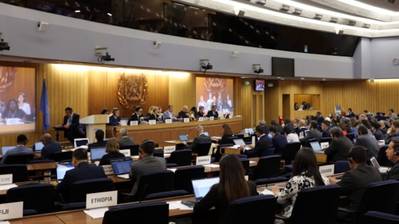IMO Council Steps Up Action on Transparency
The IMO Council met for its 132nd session from July 8 to 12, 2024, at IMO headquarters in London, and among the key outcomes of the meeting were the decisions to live-stream plenary sessions of the Council and make Council meeting documents accessible to the public.
Decisions on advancing multilingualism, improving the Global Integrated Shipping Information System (GISIS) and supporting the sustainability of the IMO Member State Audit Scheme were also taken.
The Council is the executive organ of IMO and is responsible, under the Assembly, for supervising the work of the Organization.
Red Sea attacks
The Council joined the Secretary-General in reiterating condemnation of attacks by Houthis on commercial shipping and seafarers in the Red Sea and Gulf of Aden, and called for the immediate cessation of the attacks and the immediate and unconditional release of the M/V Galaxy Leader and its crew.
Live-streaming Council meetings
To enhance transparency and access to information, the Council has decided to live-stream its plenary meetings to the public and approved a set of criteria, exemptions and procedures for live-streaming. Generally, plenary sessions will be live-streamed online, except for:
• parts of the Council during which vote casting takes place;
• parts of the Council related to the appointment of the Secretary-General;
• any other discussion that the Council may decide should not be live-streamed.
Meetings of working, drafting, review, expert, intersessional and editing groups will not be live-streamed.
Live-streaming in all six working languages of IMO will be considered as part of the Council's work on the enhancement of multilingualism.
Public access to Council documents
To enhance transparency and access to information, the Council endorsed the proposal by the IMO Secretariat to release Council documents to the public.
All Council documents submitted by the Secretariat are to be released to the public prior to a meeting, unless the Council decides otherwise in advance.
All Council documents submitted by a Member State, an intergovernmental organization or a non-governmental organization will be released to the public, unless the submitter indicates, at the time of submission, that such documents should remain private.
The Council’s summaries of decisions shall be released to the public.
Enhancement of multilingualism at IMO
The Council welcomed the progress to date on IMO’s work to enhance multilingualism in the Organization. The Secretariat outlined the Strategic Framework for Multilingualism, including a two-year road map which started in January 2024.
During the first year, the focus will be on developing the Strategic Framework, including specific action points, along with accompanying administrative and operational guidelines. This will provide a foundation for a future approach to undertaking enhancements where needed.
The Council agreed to include the dedicated dates of each of the United Nation's six official languages as a reference in the Strategic Framework and agreed to mark these dates in the calendar of IMO’s program of meetings, for the purpose of raising awareness on linguistic and cultural diversity.
Hybrid capabilities
The Council agreed to permanently establish the use of hybrid capabilities to support in-person meetings and to review its Rules of Procedure accordingly. It invited the other IMO organs to do the same.
Supporting IMO Member State Audit Scheme (IMSAS) sustainability
The IMO Member State Audit Scheme (IMSAS) became mandatory in January 2016. Individual Member States are assessed, in seven-year cycles, on their overall performance in complying with and implementing relevant IMO instruments.
The first seven-year audit cycle is expected to be completed in 2026 (audits were suspended in 2020 and 2021 due to the COVID Pandemic). To date, a total of 129 audits have been conducted in accordance with the overall audit schedule. Audited Member States were encouraged to authorize the Secretariat to release their audit final report to the public.
The Council considered the report by the Joint Working Group on the Member State Audit Scheme (JWGMSA), to discuss the challenges and lessons learned over the first audit cycle, as well as potential solutions.
The Council encouraged Member States to enhance their efforts to implement the corrective action plans (CAPs) to support the efficacy of IMSAS and to nominate qualified auditors.
The Council re-established the JWGMSA to complete the review and amend the Framework and Procedures for the IMO Member State Audit Scheme (resolution A.1067(28)) for the second audit cycle. The JWGMSA will consider a draft revised Auditor's Manual.
Enhancement of GISIS
The Council noted the ongoing progress being made to upgrade and improve the IMO’s Global Integrated Shipping Information System (GISIS). GISIS is a comprehensive online hub for the collection, processing and sharing of shipping-related data.
The process for modernization of GISIS will take place in two phases. The first phase, expected to begin in September 2024, will assess the existing conditions and needs, which will in turn guide the development of technical specifications for the GISIS upgrade. The second phase will use this information as the basis for a tendering process for the enhancement of the Organization's data management system.
The project will continue to be financially supported by the Voyage Together Trust Fund.
The Secretary-General will present a report on the progress at the next session of Council (C133).
World Maritime Day theme 2025 and Parallel Event
The Council endorsed the World Maritime Day theme for 2025, which will culminate in the celebration of World Maritime Day on 25 September 2025: “Our Ocean, Our Obligation, Our Opportunity”
The theme reflects the ocean’s vital role in the world economy, with more than 80% of global trade transported by sea. As the largest sector operating in the ocean space, shipping has a central role to play in the protection of the marine environment and management of ocean resources.
The Council accepted the offer by the Government of the Philippines to host the World Maritime Day Parallel Event in 2027.
IMO Awards
The Council selected Captain Ian Finley, Permanent Representative of the Cook Islands to IMO, as the recipient of the International Maritime Prize for 2023. The prize is awarded annually to an individual or organization judged to have made a significant contribution to the work and objectives of IMO.
The Council decided to award the 2024 IMO Award for Exceptional Bravery at Sea to two sets of nominees:
• the Captain and crew of the oil tanker Marlin Luanda, for containing a fire after the ship was struck by an anti-ship missile; and
• the Captain and crew of the tugboat Pemex Maya, for their rescue of six shipwrecked persons from four different vessels, during a hurricane.
In addition, two individuals will receive certificates of commendation for their acts of bravery and 15 others will receive letters of commendation.
The 2024 IMO Awards Ceremony is scheduled to take place in London on Monday 2 December 2024, during the 109th session of the Maritime Safety Committee.
Approval of new official holidays: Eid al-Fitr and Eid-al-Adha
The Council recognized Eid al-Fitr and Eid-al-Adha as Official Holidays at IMO. This decision will be transmitted to the Assembly, at its 34th session (A 34), with a view to adoption and subsequent implementation, including in IMO's Programme of meetings calendar.
Code of Conduct for delegates, observers and other participants at IMO Meetings, events and activities
The Council adopted the Code of Conduct for Delegates, Observers and Other Participants at IMO Meetings, Events and Activities to Prevent Harassment including Sexual Harassment.
The Secretary-General informed the Council that a confidante will be designated within the Secretariat for delegates or other participants at IMO meetings, events or activities to call upon in cases of harassment.
Consultative status granted to non-governmental organizations
The Council decided to grant consultative status to several organizations. It decided:
• to grant consultative status to CIMAC e.V. (CIMAC) and, regarding its classification by interests/activity, to place CIMAC under Standards;
• to grant consultative status to One Sea ry, on a provisional basis, for no more than two years, after which a review should be conducted and, regarding its classification by interests/activity, to place One Sea ry under Standards
• to grant consultative status to the International Fertilizer Association Limited (IFA) and the Methanol Institute (MI), and regarding their classification by interests/activity, to place IFA and MI under Cargo and Ports.
These decisions will be submitted for approval by the Assembly at its 34th session.
Financial report 2023
The Council noted IMO’s Financial Report and Audited Financial Statements for the year ended 31 December 2023, including the External Auditor's Opinion.
The report indicated a healthy overall financial position for the Organization in terms of solvency and liquidity. The closing net asset position was £63.12 million in 2023, an increase from £46.37 million in 2022.
Total revenue for 2023 was £68.33 million, a net improvement of 8.61% from 2022 (£62.91 million). This includes £33.33 million collected as Member States’ assessed contributions for 2023 – a 98.26% collection rate – in addition to voluntary contributions from donors, and revenue from commercial activities.
Budget
The Council noted that the Organization remains in a strong financial position overall. The annual budget approved by the Assembly for 2024 is £59.13 million. The projected total expenditure for 2024 is £56.54 million, which is within the budgets approved for all funds. The actual expenditure up to 30 April 2024, stands approximately at £16.37 million.
Member State contributions
The Council noted that as at July 2024, 68.47% of the current year's assessed contributions from Member States had been received. The Council urged all Member States that had not yet done so to meet their financial obligations to the Organization as early as possible.












